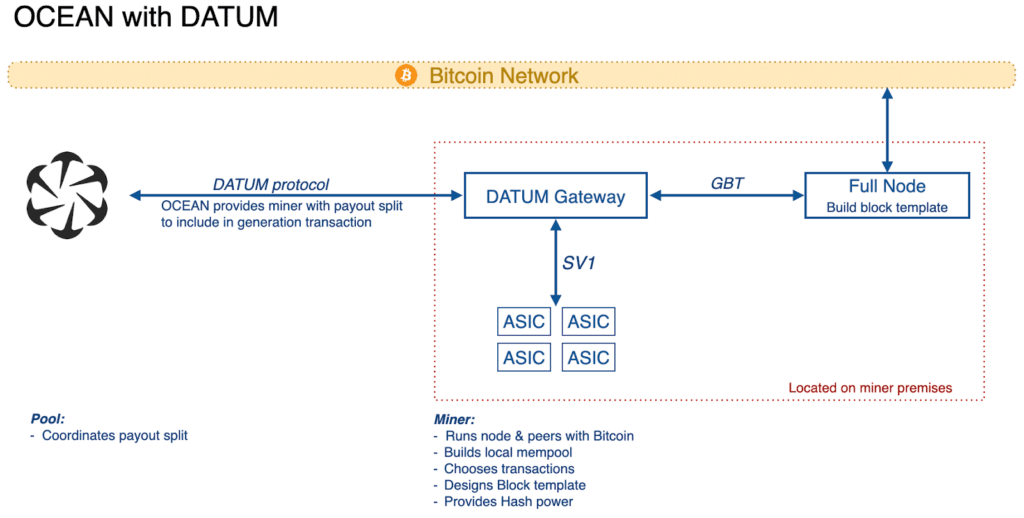-
Bitcoin Mining Decentralization is surging as Tether’s DATUM protocol bypasses centralized pools, empowering rural miners.
-
Low-bandwidth solutions like DATUM let Africans mine Bitcoin profitably—even with unstable internet.
-
Local cooperatives and crypto literacy programs are closing the digital divide, creating jobs continent-wide.
In a world where blockchain and Web3 are skyrocketing, Africa has emerged as an unexpected frontier for Bitcoin mining decentralization. Tether, renowned for its USDT, announced a partnership with OCEAN Mining, a decentralized pool with growing use cases within Africa.
This collaboration, powered by OCEAN’s DATUM protocol, hints at an ever-expanding Tether Africa strategy aimed at promoting regions with limited infrastructure.
But what does this mean for Africa’s digital economy—for a miner in Lagos, a developer in Nairobi, or an investor in Johannesburg? Let’s unpack the details.
Bitcoin Mining Decentralization Takes Root in Africa: Tether’s Bold Move with OCEAN
On April 14, 2025, the crypto industry buzzed with the latest Tether-OCEAN mining collaboration, which raised plenty of eyebrows.
As per the initial report, Tether announced it will begin channeling existing and future BTC hashrate into OCEAN Mining’s pools. This move leverages its trailblazing open-source DATUM Gateway protocol.
This marks a deliberate pivot from centralized intermediaries toward software-driven, node-controlled block construction—effectively pioneering a model suited for Africa’s bandwidth-constrained settings.
The integration of on-site block template software enables Tether to empower local rigs to select transactions autonomously, further enhancing Bitcoin’s censorship resistance and network neutrality.
The Tether-OCEAN Mining Collaboration Explained
In a nutshell, the Tether-OCEAN Mining collaboration shifts mining power away from large centralized pools, which have often been a sore spot for many African miners. This boosts geographic diversity and resilience.
According to OCEAN Mining, founded by Bitcoin Core developer Luke Dashjr, initial deployments will focus on rural and underserved regions—from Ghana’s border areas to South Africa’s Karoo province—where internet latency and throughput are traditionally limiting.
CHECK OUT: Breaking down crypto identity verification through Worldcoins innovations.
This allows the average miner to construct block templates independently, tailored to their device capabilities, addressing issues of mining centralization. No longer will you have to contend with devices that are five times more expensive.
As Tether’s VP of Mining and Energy, Giv Zanganeh, noted, “The DATUM protocol’s modular architecture offers the operational flexibility necessary for our decentralized mining strategy.”
Aligning with the Tether Africa Strategy
The well-known Tether Africa strategy combines infrastructure investment with grassroots educational outreach to create better blockchain ecosystems across the continent.
On-site deployment of DATUM software modules in Nigeria, Kenya, and beyond reduces reliance on third-party servers, while partnerships with local firms like Quidax deliver crypto literacy workshops. These initiatives equip communities with hands-on mining tutorials and foster small-scale mining cooperatives, bridging the digital divide while creating local jobs.
How This Affects You: Benefits & Considerations
For Novices & Digital Explorers
As Bitcoin mining decentralization spreads, community pools are vital options, avoiding heavy upfront capital. Local hackathons, a growing trend in many African nations, provide mining-setup challenges, offering ample learning opportunities.
At its core, the democratization of mining access allows even those with basic equipment to explore the lucrative benefits of the Bitcoin network.
For Crypto Investors & Traders
The Tether-OCEAN Mining collaboration provides transparency in hashrate distribution, granting access to networks previously unattainable with basic equipment. It also offers opportunities to predict fee markets more accurately, stabilizing long-term investment outlooks.
For Developers & Tech Entrepreneurs
The open-source nature of OCEAN enables you to study the DATUM Gateway codebase to build complementary tools like wallet integrations, block-template invalidators, or monitoring dashboards for decentralized mining pools. This empowers African developers to create solutions tailored to their region’s needs.
For Crypto Miners
DATUM’s lightweight protocol exemplifies low-bandwidth Bitcoin mining solutions, enabling mining in areas with unstable internet—no third-party servers required.
By joining decentralized mining pools, miners in rural Africa can earn rewards without relying on centralized infrastructure, transforming previously marginalized regions into competitive network nodes.
Technical Deep Dive: How DATUM Protocol Works & Decentralization Mechanics
At its core, DATUM (Decentralized Alternative Templates for Universal Mining) allows each miner’s node to build its own block templates, bypassing default construction by centralized pools. This alters mining dynamics by distributing power more equitably.

Illustration of Datum protocol.[Photo: Ocean]
Bandwidth Optimization
By aggregating rig connections under constrained connectivity, DATUM enables efficient mining in regions with spotty internet. Benchmarks show sub-100 ms latency for block propagation in simulated rural networks, ensuring competitive block discovery despite geographic distance.
Transaction Selection
Miners can prioritize transactions aligned with local priorities, fine-tuning to regional needs. This granular control answers the question: How does the DATUM protocol enhance decentralization? By placing decision-making power directly in miners’ hands.
Security Considerations
Peer-to-peer validation and block template authenticity checks guard against malicious template injection, preserving Bitcoin’s integrity. As Luke Dashjr, OCEAN’s Chairman and CTO, emphasized, “Decentralization isn’t just an ideal—it’s a security feature.”
Charting Africa’s Decentralized Mining Future
By harnessing Tether’s hashrate and OCEAN’s open-source DATUM Gateway, African miners stand at the forefront of Bitcoin mining decentralization. This evolution democratizes block production while aligning with Web3Africa.news’s mission to empower through education and community-driven growth.
African miners stand at the forefront of Bitcoin mining decentralization via harnessing Tether’s hashrate and OCEAN’s open-source DATUM Gateway. This evolution democratizes block production while empowering communities through hands-on education and infrastructure.
As Luke Dashjr noted, this collaboration “reinforces the importance of censorship-resistant protocols,” ensuring Bitcoin remains a tool for financial freedom—a factor we at Web3Africa seek to embrace and advance across the continent.

